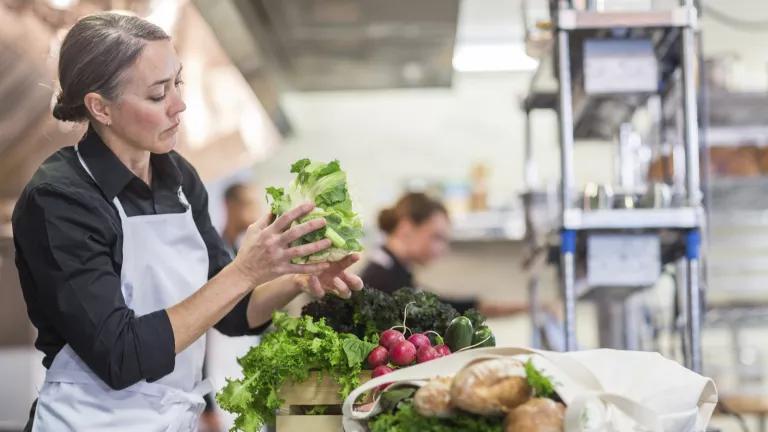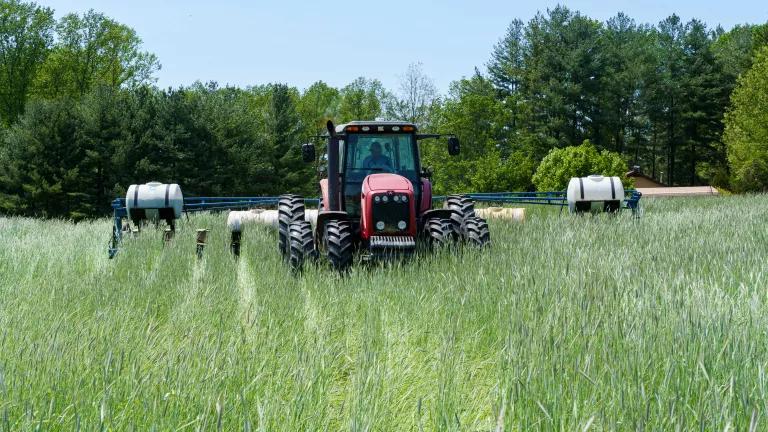2021 Year-In-Review: Food Waste
We are in the critical decade for food waste action. As we progress toward our national goal to reduce food waste generation by 50% by 2030, despite navigating life through a pandemic, good work to reduce food waste continues. This blog recaps some of the highlights of our year’s work, along with other key developments in food waste.

We are in the critical decade for food waste action. As we progress toward our national goal to reduce food waste generation by 50% by 2030, despite navigating life through a pandemic, good work to reduce food waste continues. For example, this year ReFED published the Insights Engine, a valuable resource for food waste data and reduction strategies. NRDC was busy this year, working on many levels (federal, state, local, and household) and using all the tools in our toolbox (including research, policy advocacy, program development, and consumer education) to prevent food from going to waste, rescue surplus food, and compost food scraps. This blog recaps some of the highlights of our year’s work, along with other key developments in food waste.
The Federal Level
Momentum at the federal level around food waste reduction has been building for years. In April 2021, NRDC, along with coalition partners Harvard Food Law and Policy Clinic, ReFED, and World Wildlife Fund, released the U.S. Food Loss and Waste Action Plan, which outlines the federal leadership needed to achieve our national food waste reduction goal. Other action plans and reports that outline food waste priorities and recognize food waste as a climate solution include the U.S. Methane Emissions Reduction Action Plan, in which reducing food waste in landfills, the number one component in our landfills, is listed as a top solution to reducing methane emissions. The EPA also released a pivotal report on the impacts of wasted food – the most staggering finding being that each year, U.S. food loss and waste from farm to kitchen alone embodies the same GHG emissions as 42 coal-fired power plants.
Also in 2021, there were unprecedented investments in food waste reduction, like the $70M per year authorized in the bipartisan Infrastructure Act, which will support municipal recycling education and improvements to local waste management systems. The National Science Foundation (NSF) invested $15M in the Multiscale RECIPES project, a network of researchers, institutions and organizations (including NRDC) working across the food system to advance the science needed to make our wasteful food system more sustainable, equitable, and resilient. USDA also granted $2 million to 24 local governments for community compost and food waste reduction projects.
With support from non-profit and private stakeholders around the U.S., the federal government is showing the leadership we need through the introduction of multiple bills that will fundamentally change the tide of food waste in the U.S.:
- The Zero Food Waste Act and the COMPOST Act (July), introduced in tandem, would help support the expansion of food waste reduction and management across the country.
- The Fresh Produce Procurement Reform Act (September) would create a USDA program to contract with farmers and other food providers to donate fresh produce for food rescue organizations.
- The School Food Recovery Act (September) would create a new program at USDA that would provide grants to schools to work on food waste reduction projects.
- The Food Donation Improvement Act (November) would making donating safe food easier for businesses and organizations.
- The Food Date Labeling Act (December) would end consumer confusion around food date labeling and boost the consumption and donation of safe, edible food.
The State Level
While cities are valuable partners for us in deploying programs and policies to tackle food waste, often state policies can provide incentives and clarification (and sometimes barriers) that affect municipal strategy development. As an outgrowth of our city-based Food Matters Regional Initiative, we worked with a group led by the Center for EcoTechnology to compile inventories and gap analyses of ten categories of food waste-related policies in twelve states.
Many states are in various stages of enacting legislation that helps address food waste reduction. For example, this year, Maryland became the ninth state to enact requirements to divert food waste from landfill. The law, which takes effect in January 2023, will boost both surplus food rescue and food scrap composting by requiring commercial generators of large amounts of food waste to prevent food from going to waste, donate to food rescue organizations, and ensure recycling for any remaining food scraps. Initial data from states that have passed similar bills show that these bills do help reduce the amount of landfilled food waste, with associated increases in prevention, donation, and recycling.
In California and New York, already-enacted legislation is slated to take effect in January 2022. California’s SB 1383 establishes goals for reducing the amount of food waste sent to landfills as part of the state’s methane reduction plans and requires every jurisdiction to enact strategies to meet the state target of reducing organic waste disposal by 75% by 2025. The law also sets a target of rescuing at least 20% of currently disposed surplus food by 2025.
In New York state, the NYS Food Donation and Food Scraps Recycling law requires businesses and institutions generating an annual average of at least two tons of wasted food per week to donate excess edible food and to recycle all remaining food scraps (through compost, anaerobic digestion, etc.).
Setting targets for food rescue, as both these states have done, helps increase the amount of food donated, as well as establishing more connections between food donors and recipients.
The Regional and Municipal Level
Cities and counties continue to drive innovative local solutions for food waste reduction. This year we have seen many public commitments to reduce food waste from city leadership in the form of public proclamations, resolutions, and city budgets funding food waste initiatives. And cities are getting creative in raising awareness about household food waste. NRDC’s Food Matters Regional Initiative continues to provide support for cities to advance their food waste reduction goals without reinventing the wheel, by leveraging peer learning and shared resources.
To ensure that city food waste initiatives have the momentum and support they need to continue meaningful progress on food waste reduction, NRDC has expanded our suite of tools for cities. This year we:
- Updated our health inspector tool based on feedback from partners and to make the tool easier for cities to customize
- Co-created model compost procurement policy language with the Environmental Law Institute
- Released a new report, Feeding a City: Food Waste and Food Need Across America, which analyzes results of NRDC's baseline calculator tool applied to 22 U.S. cities and identifies key patterns and recommendations.
Cities and partners are increasingly making connections between municipal climate action planning and food waste reduction, recognizing that solving the climate crisis cannot take place without addressing food waste. The Environmental Law Institute released a report, A Toolkit for Incorporating Food Waste in Municipal Climate Action Plans, which includes model provisions that municipalities can use to incorporate food waste measures into their municipal climate action plans.
While we are encouraged by this year’s progress in food waste reduction, there is still significant work ahead. In order to reach our goals, we need better data collection and measurement, strong policies at all levels of government, and shifts in consumer and business mindsets around food waste. We would also like to see food waste play a larger part in the climate conversation and greater inclusion of health and racial equity in food waste solutions.
We have so much room to grow and we are excited for what the next year will bring. On the federal level, we look forward to increasing the amounts of funding going to support local efforts, working to strengthen food waste provisions in the Farm Bill, and expanding investments resulting from the Build Back Better Act and other federal policies. On the municipal level, we will continue to support cities, build their capacity to affect state policy, and expand our network. At the household level, we are excited for the progress the RECIPES group will make and we plan to share learnings from a household food waste study we conducted in Denver. All of this work depends on collaboration, and we are happy to be part of the movement to create a more sustainable and equitable world.








